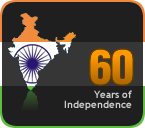It was here at the club I was introduced to Dubonnet, a sweet wine, which I really enjoyed, and given a choice, I always went for that. The children were given a treat at the club once a week, the club’s special open toasted sandwich with tomato and onion chutney, which we had never tasted before, or after our time in Pondicherry.

 It was something different and new and enjoyed by all.
It was something different and new and enjoyed by all.Soon after our arrival in this town, there was a fancy dress party for the children, held in the club. Just to introduce the children to the club, I had Viji, a six-year old, dressed as a South Indian bride,

and Bala, a ten year old then as a bridegroom. Raji was dressed as a gypsy girl. The costumes were a success, and appreciated by all.
Later on there was a fancy dress party for the adults as well, and Babuji and I took part. I was a Malayali woman and wore the traditional white mundu - neriyathu, and Babuji was a Reddiar, with diamond earrings sparkling in his ears.

On the last Saturday of every month, the club used to organise a dinner- dance party which was well attended from the Chief Commissioner downwards. Ninety nine percent of the club members were non-vegetarians. On Saturdays they refrained from non- vegetarian food. Hence accordingly, the dinner used to be announced only after midnight. The music and the dance, starting from 9 pm or 9.30 pm went on into the small hours of the next day.
Though neither of us danced, Babuji and I used to go regularly to listen to the music and watch the others dance. One couple used to do the rock and roll so well that all the other dancers would move back and give them the whole floor. And this couple, the Squires, used to do full justice to this privilege.
Mr. Kripalani was really surprised when he asked me for a dance once, and I told him that I did not dance. His next question was, “Well, then, do you sing?”
“No.”
“Do you play tennis? Do you play bridge? Do you swim?” were his next questions, to all of which my answer was – “No.”
He was really taken aback, and asked me seriously, “Then how do you manage to survive?”
Mr. Kripalani belonged to the Indian Civil Service cadre, whose members were trained in England in pre-independent years, and these officers were totally anglicized. Well, actually, there are some exceptions to this. And we came to know one of them in Trichy, while we were there for ten months. He was a District Judge there. A Malayali, he was not in the least anglicized, and he and his family were very down-to-earth people. His children and Raji and Bala were good friends, and went to school together. Mr. Kripalani, being a bachelor, and used to his own life-style, could not understand that a housewife with four demanding children and a husband, had plenty of reasons to survive, without any other outside recreations.
What really knocked me out was seeing a whole roasted pig, with a garland round its neck and a nimboo in its mouth as the centrepiece at the non-vegetarian table. Thank goodness I was able to hide my feelings and surprise from showing on my face. I had seen pictures like this in many English magazines, and that saved me.
 There was a separate table for the vegetarians – “The Grass Eaters” we were called. Today’s grass eaters, or, shall I say grass smokers, use a different grass.
There was a separate table for the vegetarians – “The Grass Eaters” we were called. Today’s grass eaters, or, shall I say grass smokers, use a different grass.The club used to hold dinner dance parties for visiting dignitaries too. There were also magic shows, puppet shows and mono-acting shows. Special Christmas parties for the children were held, too. All told, the club life was enjoyed by everybody. It was a kind of life which we had never experienced before, or after our Pondy life.
In Pondicherry we were one in a hundred. Coming back to Delhi, we were just one in a million.






